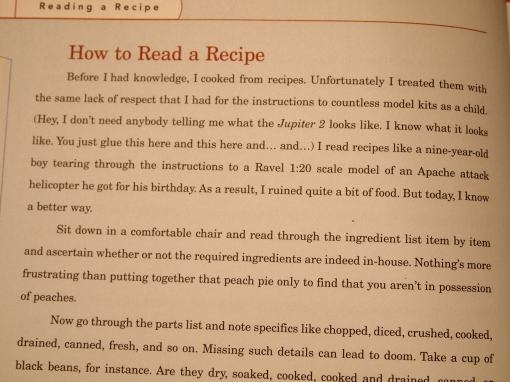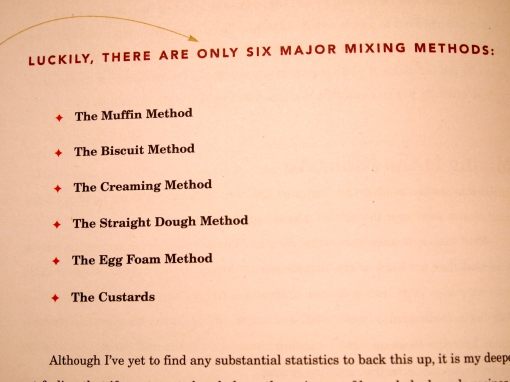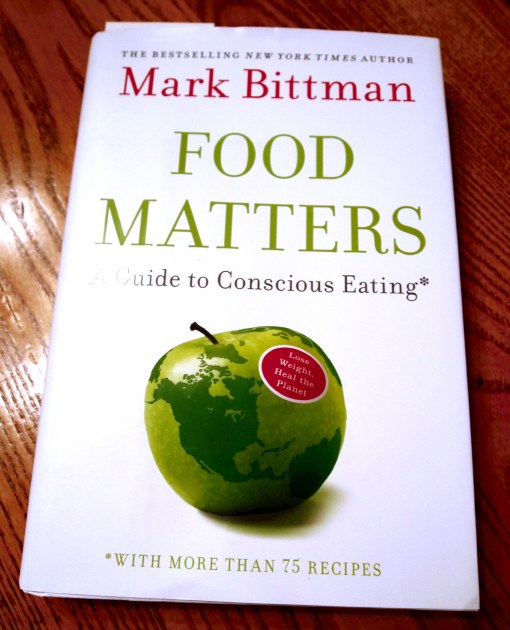Cookbooks can contain a wealth of information beyond just recipes. Some cookbooks act as an anthropological record of society and culture at a given point in time. Some are instructional. Some whimsical. Some humorous. What? You’ve never read a funny cookbook? They’re out there, if you just know where to look.
I read cookbooks like some people read novels. I could go on and on about my favorite cookbooks, because I’m kind of dorky like that, however since the list is fairly extensive and y’all have lives outside of reading my little blog, I thought I would start with the ones that inspire me and make me a better cook. When I first learned to cook, cookbooks were my lifeline. I followed the recipes to the letter because quite frankly, it never occurred to me to deviate from the text. As I grew *ahem* older, I wanted to be a little more creative and cook from instinct. I am passionate about food, so I want to know the how/why behind recipes and cooking methods so that I fully understand the process and improve my own abilities.
I firmly believe that anyone can cook great tasting food after gaining a little insight into ingredients, and cooking methods. (Yes, really!) Nothing is too difficult when you break it down into baby steps, which is what I hope to convey with the recipes posted here on Comfortably Domestic. I want you to see the food, want to devour it, and be confident enough with the method that you are inspired to try it at home.
So whether you want to learn the basics of how to cook, or just want to learn more so that you become better at the craft, here are my favorite instructional cookbooks:
The Best Recipe by the Editors of Cooks Illustrated magazine.
This is by far one of my favorite method cookbooks because they not only give you a recipe, but also a page or two of text explaining what flavors/textures they were trying to achieve, and the different methods/ingredients that they played around with to achieve the desired result. This is great because you can learn from their mistakes, or find a different recipe if their end results don’t match your own preferences.
For example, say that you want to make creme brulee. You read that their desired texture for cream brulee is firm and eggy. You prefer a make smooth and creamy creme brulee, so you know to look for a different recipe. No wasted effort and ingredients!
The Best Recipe also provides detailed illustrations for just about every cooking or preparation technique. This is very helpful if, like me, you buy a semi-boneless leg of lamb for Easter dinner, and didn’t realize that removing a stinky lymph node would be required before cooking.
Joy of Cooking by Irma S. Rombauer and Marion Rombauer Becker
I have a vintage copy of Joy of Cooking, and it is probably my number one resource for ingredient and method research. The first 1/3 of the book explores different types of heat, ingredients, and cooking methods. With thousands of recipes, each new recipe category has text explaining any new methods needed for that chapter. The sourdough method and recipe that I posted in my Fear Not Bread series last fall are from this cookbook. This is a great book for a things-Grandma-should’ve-told-you-about-cooking approach to the basics and beyond.
I’m Just Here For the Food by Alton Brown.
Famed host of Food Network’s Good Eats, Feasting on Asphalt/Waves, and Iron Chef America, Alton Brown knows how food works. He is a technical guy that set out to write a cookbook that focused on the foundation of all cooking: heat.
He begins by explaining how to read a recipe, then explores the different types of heat, and the methods of searing, roasting, braising, boiling, and frying, with categorical recipes for each. I’m Just Here For the Food earned him the coveted James Beard Award–which is the equivalent of winning the Culinary Super Bowl. The book is very conversational, somewhat kitschy, and easy to understand. Oh, and he’s funny! Any cookbook author that makes a This Is Spinal Tap reference in his text is all right with me.
“This one goes to eleven.”
I’m Just Here For More Food by Alton Brown.
In his follow up to I’m Just Here For the Food, AB explores the realm of baking. (Food x Mixing + Heat = Baking) He explains that all baking can be broken down into six major mixing methods, and provides numerous recipes for each method. This book is a great starting point for any aspiring baker.
The Art of Simple Food by Alice Waters
Founder of the famed Chez Panisse restaurant, and well known proponent of the Slow Food Movement, Alice Waters minimalist approach to delicious food hinges on the use of fresh, local, sustainable ingredients obtained directly from farms or farmers markets.
She explains her culinary philosophy, as well as how to cook from scratch, and plan menus. The recipes are simple, and easy to follow.
Much of the book is dedicated to ingredients: what they are, when they are in season, and what to do with them. The Art of Simple Food is a must for anyone wanting to cook from scratch, and eat responsibly.
Culinary Artistry by Andrew Dornenburg and Karen Page
I picked up Culinary Artistry based on the recommendation from a chef of one of my favorite local restaurants. Half of the text is like listening in on conversations with James Beard Award winning chefs talking about how they feel about the food they create. Think chef-as-artist. Chefs discuss their menus, techniques, provide a sample menu, and offer a few recipes. Sounds pretty dorky, eh? Well, it is, BUT…
…the other half of the book is full of these nifty little ingredient spreadsheets. The primary ingredient is listed in bold type, along with when it is in season. Then they list all of the other ingredients that will compliment the primary ingredient, along with the best cooking methods to use.
Seriously–how cool is that? Definitely worth the price of admission.
The Food Matches Made in Heaven section is an invaluable resource when trying to cook from scratch, cook on the fly, or even see what can be combined with stuff already in the pantry to make a meal.
If you are exceptionally dorky like me, you’ll get a kick out of the food anthropology tidbits scattered about.
Food Matters: A Guide to Conscious Eating by Mark Bittman.
Food Matters is heavy on New York Times columnist Bittman’s no-nonsense approach to eating responsibly for the environment, and your body. Before your eyes glaze over, know that his approach to responsible eating does not demand subsisting solely on beans, rice, and tofu, or being deprived of comfort food.
Because y’all know that I’m all about comfort food! I also happen to live with 5 males that would not eat rice with beans or tofu if their lives depended on it.
The recipes are a collection of simple combinations of fresh food, punctuated with a lot of great add-in ideas. Bittman is also the author of How to Cook Everything, and many other cookbooks featuring simple, approachable recipes.
So there ya have it–my favorite instructional cookbooks. Think of them like a Cooking 101 course in the privacy of your own home.
BTW–NanaBread did a great post about her favorite cookbooks, here.
Not-so-fineprint: None of the authors, their publishers, the James Beard Foundation, or Amazon.com have any idea who I am. I think it would be super cool if they did, but for now I will just stalk appreciate them from afar.





























Comments